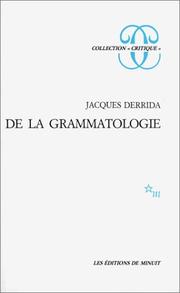Summary
In Of Grammatology, Derrida discusses writers such as Claude Lévi-Strauss, Ferdinand de Saussure, Jean-Jacques Rousseau, Étienne Condillac, Louis Hjelmslev, Emile Benveniste, Martin Heidegger, Edmund Husserl, Roman Jakobson, Gottfried Wilhelm Leibniz, André Leroi-Gourhan, and William Warburton. In the course of the work he deconstructs the philosophies of language and the act of writing given by these authors, identifying what he calls phonocentrism, and showing the myriad aporias and ellipses to which this leads them. Derrida avoids describing what he is theorizing as a critique of the work of these thinkers, but he nevertheless calls for a new science of "grammatology" that would explore the questions that he raises about how to theorize the act of writing. [2]
Of Grammatology introduced many of the concepts which Derrida would employ in later work, especially in relation to linguistics and writing. [3]
Saussure and structuralism
The book begins with a reading of Saussure's linguistic structuralism as presented in the Course in General Linguistics , and in particular signs, which for Saussure have the two separate components of sound and meaning. These components are also called signifier (signifiant) and signified (signifié). [4]
Derrida quotes Saussure: "Language and writing are two distinct systems of signs; the second exists for the sole purpose of representing the first." [5] Highlighting the imbalanced dynamic between speech and writing that Saussure uses, Derrida instead offers the idea that written symbols are in fact legitimate signifiers on their own, and should not be considered as secondary, or derivative, relative to oral speech. [6]
Reading of Rousseau
Much of the second half of Of Grammatology consists of a sustained reading of Jean-Jacques Rousseau, especially his Essay on the Origin of Languages . Derrida analyzes Rousseau in terms of what he calls a "logic of supplementarity," [7] according to which "the supplement is exterior, outside of the positivity to which it is super-added, alien to that which, in order to be replaced by it, must be other than it." [8] Derrida shows how Rousseau consistently appeals to the idea that a supplement comes from the outside to contaminate a supposedly pure origin (of language, in this case). This tendency manifests in many different binaries that Rousseau sets up throughout the Essay: writing supplements speech, articulation supplements accent, need supplements passion, north supplements south, etc. [9] Derrida calls these binaries a "system of oppositions that controls the entire Essay." [10] He then argues that Rousseau, without expressly declaring it, nevertheless describes how a logic of supplementarity is always already at work in the origin that it is supposed to corrupt: "This relationship of mutual and incessant supplementarity or substitution is the order of language. It is the origin of language, as it is described without being declared, in the Essay on the Origin of Languages." [11]
This page is based on this
Wikipedia article Text is available under the
CC BY-SA 4.0 license; additional terms may apply.
Images, videos and audio are available under their respective licenses.
